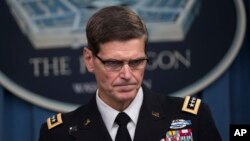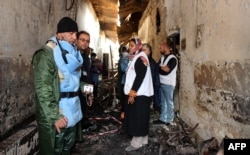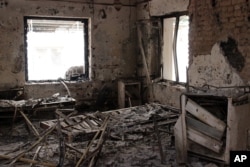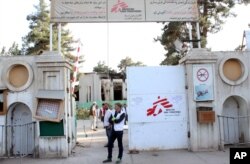The U.S. military has disciplined 16 service members for their role in a deadly airstrike in Afghanistan last year that killed 42 people and destroyed a hospital run by the international medical charity Doctors Without Borders, and it has concluded the incident was not a war crime.
General Joseph Votel, the commander of U.S. Central Command, told reporters Friday at the Pentagon that an investigation into the incident found the tragedy was a result of an "extraordinarily intense situation" that included multiple equipment failures.
He said the airstrike was not deemed a war crime because "the personnel involved did not know they were targeting a medical facility."
"The fact that this was unintentional, an unintentional action, takes it out of the realm of actually being a deliberate war crime against persons or protected locations," he said.
That finding is consistent with a preliminary investigation released by the U.S. military in November, when commanders emphasized that U.S. forces both on the ground and in the air did not intentionally target the hospital.
The military punishments include letters of reprimand, which could lead to "denial of promotion" and "possible separation from the service," according to Votel. The 16 U.S. service members found at fault include a two-star general.
MSF reaction
Doctors Without Borders, also known as or MSF or Médecins Sans Frontiers, said it was examining the U.S. findings to determine whether the account answers the many outstanding questions they still have seven months after the attack.
"With multinational coalitions fighting with different rules of engagement across a wide spectrum of wars today, whether in Afghanistan, Syria, or Yemen, armed groups cannot escape their responsibilities on the battlefield simply by ruling out the intent to attack a protected structure such as a hospital," said MSF President Meanie Nicolai on Friday.
MSF also has consistently said that it cannot be satisfied solely with a military investigation into the Kunduz attack. MSF's request for an independent and impartial investigation by the International Humanitarian Fact Finding Commission has so far gone unanswered.
"Today's briefing amounts to an admission of an uncontrolled military operation in a densely populated urban area, during which U.S. forces failed to follow the basic laws of war," Nicolai said. "It is incomprehensible that, under the circumstances described by the U.S., the attack was not called off."
Tragic errors
The investigation revealed the U.S. force on the ground was fatigued from fighting and running low on supplies when the airstrike was called up. The AC-130 gunship was, therefore, launched 69 minutes earlier than originally planned.
"As a result, the crew did not get all of the preparatory information they would normally have received before a mission, to include an identification of no-strike areas,'" Votel said.
Once in the air, a satellite radio antenna failed, which would have allowed them to receive that information and send out pictures of the target.
The AC-130 gunship was then shot at by enemy forces using a surface-to-air missile.
"That's a very significant thing. That does not happen a lot in Afghanistan," Votel told reporters.
The attack forced the gunship to move several kilometers away from the city center, and when the crew plotted the coordinates of the Taliban target, it directed them to an open field. The nearest building that matched the physical description of the target was the hospital, which the crew mistakenly concluded was the Taliban-controlled building that they had been sent to hit.
"They were trying to support our Afghan partners. There was no intention on any of their parts to take a shortcut or to violate any rules that were laid out for them," Votel underscored.
The barrage on the hospital lasted about 30 minutes, the military said in its investigation of the incident. MSF notified the U.S. military about the attack approximately 10 minutes into the strike, but Votel said it took several minutes to run through the military layers and reach the ground commander.
As soon as the commander made the determination that they had mistakenly targeted the MSF hospital, the AC-130 gunship crew stopped firing, Votel added.
Changes made
About 9,000 U.S. Forces-Afghanistan personnel underwent training designed to minimize the risk of another U.S-caused tragedy as a result of the hospital bombing in Kunduz.
In addition, U.S. aircraft systems are now pre-loaded with key information, including the "no-strike list data base," Votel said, in order to "minimize the reliance of post-launch communications." U.S. Forces-Afghanistan has also provided the leadership of Doctors Without Borders with a way to contact U.S. command centers directly.
Afghan government
The Afghan government welcomed the release of the report and the assurances that measures have been taken to prevent such incidents in the future. However, survivors and relatives have demanded harsher punishments and financial assistance.
Hamdullah, who did not want his last name used, said he was in the laundry section of the hospital on the night of the attack. When the attack began, the windows broke and the glass shards hit him as he took refuge against a wall. His uncle, a doctor at the hospital, died.
"We were treating patients. Whoever they were, they were human beings," Hamdullah said. "We didn't differentiate, if they were Americans, soldiers, Taliban or somebody else. We were just treating human beings. They killed doctors. This [hospital] is a place which is given protection everywhere. They bombed this place. Removing them from their positions is not enough, they should be executed. They should also financially support the children of those who were killed."
Saeed, a colleague of Hamdullah's at the MSF Hospital, said, "I am not even one percent satisfied with this punishment. They should be tried in open. This punishment is making a joke of us."
Ibrahim Nasser of VOA's Pashto Service contributed to this report.







